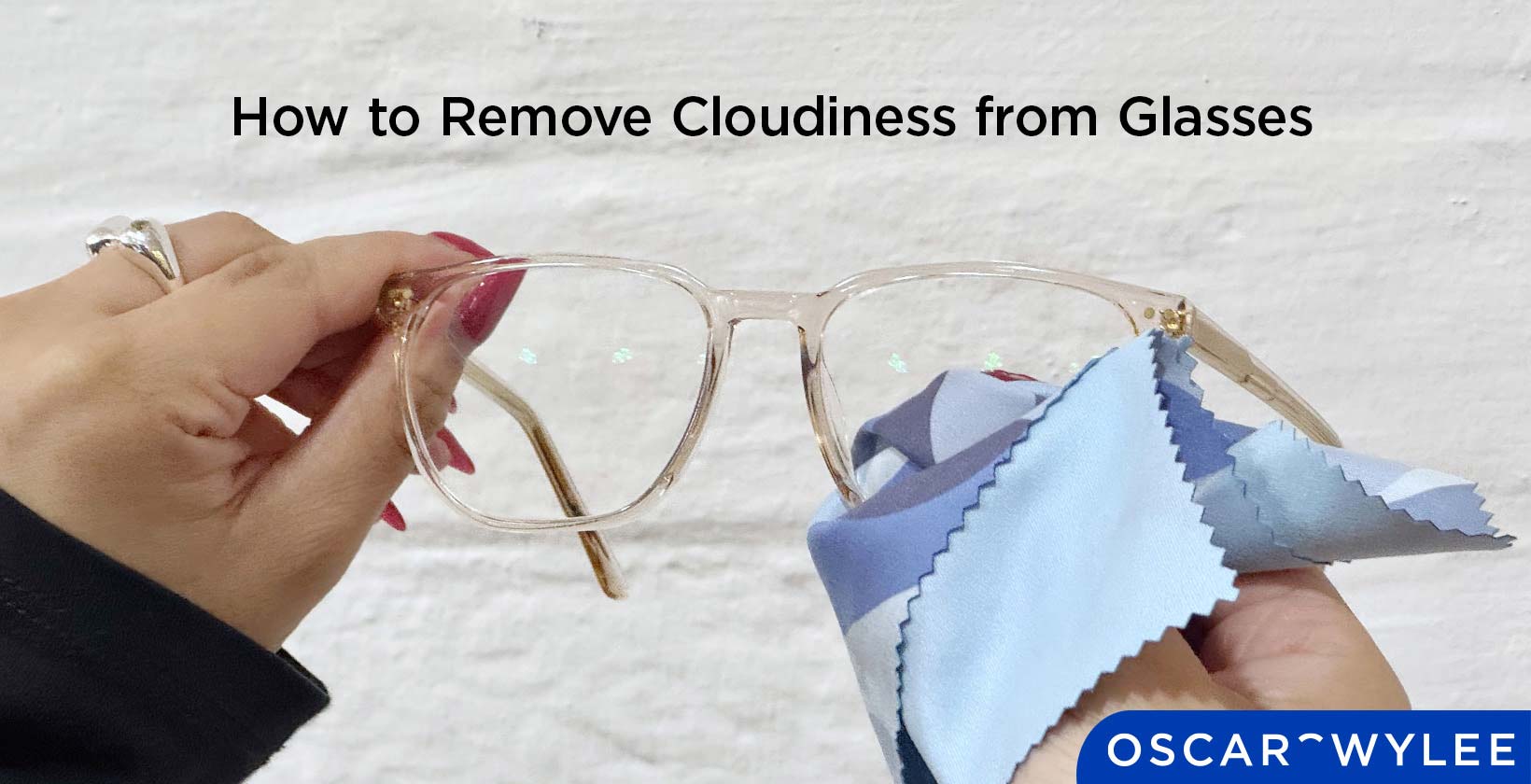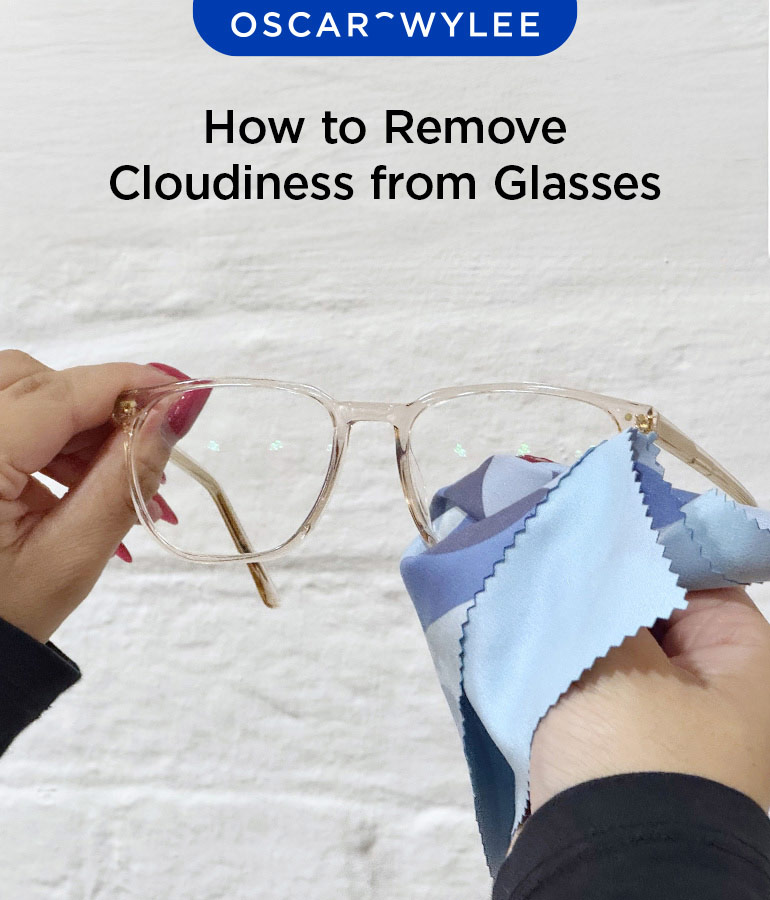How to Remove Cloudiness from Glasses
Published on November 13th, 2025
To remove cloudiness from glasses you should first wash your hands, rinse your glasses under lukewarm water, dry with a microfibre cloth, spray lens cleaner on the lenses, buff the lenses with the microfibre cloth. These tips are thorough for removing cloudiness from glasses, to ensure a clean and clear lens providing optimal visual clarity.
To remove cloudiness from glasses you should first wash your hands, rinse your glasses under lukewarm water, dry with a microfibre cloth, spray lens cleaner on the lenses, buff the lenses with the microfibre cloth. The steps to remove cloudiness from glasses are listed below.
- Wash Your Hands: Wash your hands to ensure clean handling of the frames.
- Rinse Glasses Under Lukewarm Water: Rinse glasses under lukewarm water to get rid of initial debris
- Apply a Drop of Mild Dish Soap: Apply a drop of mild dish soap to help remove cloudiness and dust.
- Rinse Thoroughly Again: Rinse thoroughly again to remove dish soap
- Dry with a Microfibre Cloth: Dry your glasses with a microfibre cloth to remove remaining liquid.
- Use Lens Cleaner: Use lens cleaner to add a shine to your glasses.
1. Wash Your Hands
Wash your hands thoroughly with soap for 20 seconds under running tap water. This will ensure your glasses are handled in a cleanly fashion.
2. Rinse Glasses Under Lukewarm Water
Rinse glasses under lukewarm water to get rid of initial debris and cloudiness. You will want to do this under a gentle stream of lukewarm water. Hot water is likely to damage any lens coatings you may have. Cold water may be used however lukewarm water is more preferred.
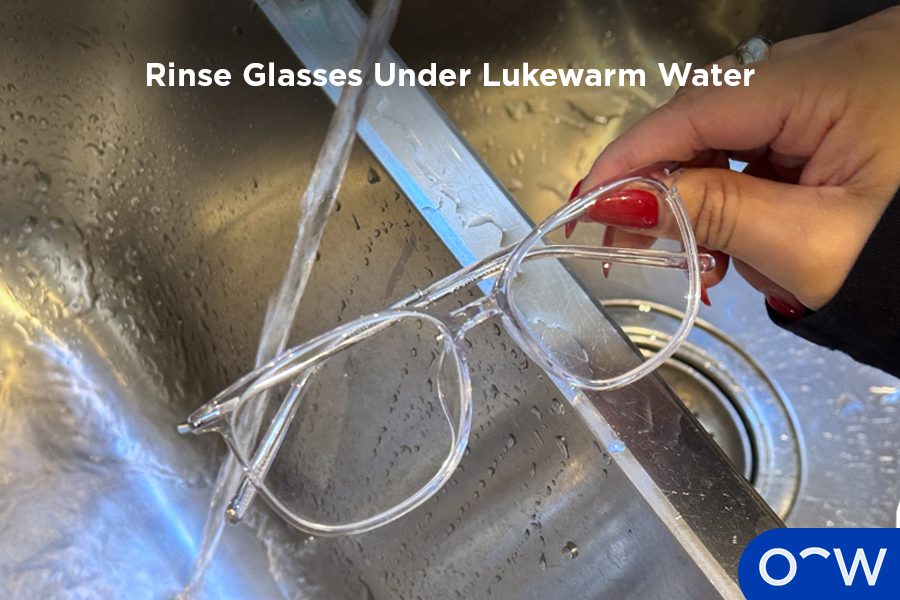

3. Dry With A Microfibre Cloth
Dry your lightly rinsed glasses with a microfibre cloth. A microfibre cloth is the best drying method as it is a sensitive material, unlikely to cause abrasions to your lenses.
4. Spray Lens Cleaner on the Lenses
Spray lens cleaner on the lenses generously. At Oscar Wylee, we offer high quality lens cleaners to prevent cloudy or dirty lenses.
5. Buff Lenses with Microfibre Cloth
Buff and shine your lenses with a microfibre cloth for a finishing gleam to your lenses. This will be the final step to ensuring a clear lens free from cloudy residue.
Why Do My Glasses Get Cloudy or Hazy Over Time?
Glasses can get cloudy or hazy over time mainly due to weather conditions. Dusty, foggy or polluted conditions can lead to a build up of debris and fog up the lenses of your glasses. Even breathing, namely heavy breathing or mouth breathing, can lead to foggy glasses.
What Causes a White Film to Form on Eyeglass Lenses?
A white film can form on eyeglass lenses if they are cleaned with soaps or other substances with harsh chemicals. Harsh soaps and liquid cleaners should never be used when cleaning eyeglass lenses as these can strip lens coatings and lead to a white film forming. Instead, mild, fragrance-free and lotion-free soaps are more gentle and effective for cleaning. Makeup and oils can also lead to a white film if they consistently rub off on your lenses. To combat the formation of a white film, it is important to clean your prescription glasses regularly.
Why are My Glasses Foggy Even After Cleaning?
Your glasses may be foggy even after cleaning due to residual moisture, damaged lens coating or face oils that transfer onto your frames. The reasons for glasses being foggy even after cleaning are listed below.
- Residual Moisture: Residual moisture from the liquid cleaner and water used to clean your lenses may still be present on the surface. Ensure it is wiped down thoroughly to avoid the lenses fogging up.
- Damaged Lens Coating: A damaged lens coating may mean glasses are foggy after cleaning. Reasons include frames having contact with hot or warm water or harsh cleaning products. This can lead to crazing which is where a web of tiny cracks that can appear on the lenses, often leading to cloudiness.
- Face Oils: Face oils emerge from oily skin and even oils from makeup products. These can transfer to your glasses lenses and create a film of grime, contributing to a foggy frame.
Why do My Glasses Get Greasy or Smudged So Easily?
Your glasses can get greasy or smudged easily due to factors such as handling with unclean hands, face oils and condensation from breath. Ensure you are handling your glasses with clean hands and avoiding touching the lenses, instead handling them through the temples. Face oils and condensation from the breath will happen naturally as you wear the glasses, particularly on days with extreme weather conditions. It is important to have your lens cloth on hand so you can wipe your lenses gently whenever there is grease present, to avoid build-up.
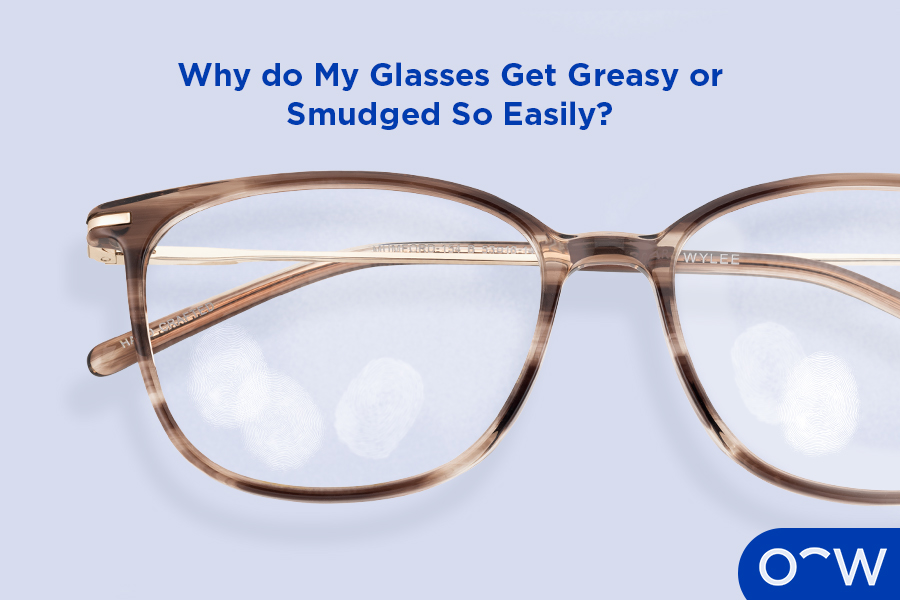

Why Do Polycarbonate Lenses Become Cloudy?
Polycarbonate lenses can become cloudy due to the environment they are worn in. Polycarbonate lenses are glasses lenses made from a type of thermoplastic that is thin, lightweight and impact resistant. These properties make polycarbonate lenses desirable for children’s eyewear, safety glasses and sports goggles. Safety glasses for example are worn in environments such as woodworking spaces or gardening, leaving them exposed to elements such as dust, debris and fog. As a result, the polycarbonate lenses on these glasses can become cloudy and foggy.
What Should You Avoid When Cleaning Glasses with a Coating?
You should avoid hot water, alcohol based cleaning products and abrasive materials when cleaning glasses with a coating. This also applies to every type of glasses lens, not solely glasses with a coating. Read more about the things to avoid when cleaning glasses with a coating.
- Hot Water: Hot water is not good for cleaning glasses with a coating. Hot water can damage lens coatings and even warp the frame material of your glasses. Stick to lukewarm water.
- Alcohol Based Cleaning Products: Alcohol based cleaning products should not be used when cleaning glasses with a coating. These are too strong and can damage the lens coatings. Instead use a mild, fragrance-free and lotion-free dish soap to gently clean the lenses.
- Abrasive Materials: Abrasive materials should not be used when drying the glasses after cleaning, such as paper towels or hand towels. Instead, use a microfibre cloth to dry the lenses as this is a gentle material.
What is the Safest Way to Clean Plastic or Polycarbonate Lenses?
The safest way to clean plastic or polycarbonate lenses is with lens cleaner and a microfibre cloth. This can be done regularly and the safest and easiest way to clean lenses. Simply spray the surface of the lens with a lens cleaner, such as the Oscar Wylee lens cleaner, and rub and buff it gently with a microfibre cloth.
How Can You Prevent Glasses From Getting Cloudy Again?
You can prevent glasses from getting cloudy by cleaning your glasses regularly with lens cleaner and a microfibre cloth. Preventing cloudiness can happen when you regularly clean lenses with a generous amount of lens cleaner, alongside wiping them with a microfibre cloth. If there is a build-up that is hard to clean, gently washing under lukewarm water alongside the lens cleaner might be effective. You might like to try an anti-fog spray as a preventative measure to ensure your glasses don't get cloudy easily. While it is unlikely you will never have foggy glasses again after implementing measures such as these, they will ultimately be less likely to fog if there is regular care.
How Often Should You Deep Clean Your Eyeglasses?
You should deep clean your eyeglasses at least once a week or whenever necessary depending on how often they are used. This will encompass gently washing your frames and potentially using a mild dish soap for cleaning the frames. For the lenses you should generously spray them with a lens cleaner and buff them with a microfibre cloth. For a quicker clean to maintain your eyeglasses lens quality, you should wipe your lenses daily at minimum, or when they start to get dirty or smudged.
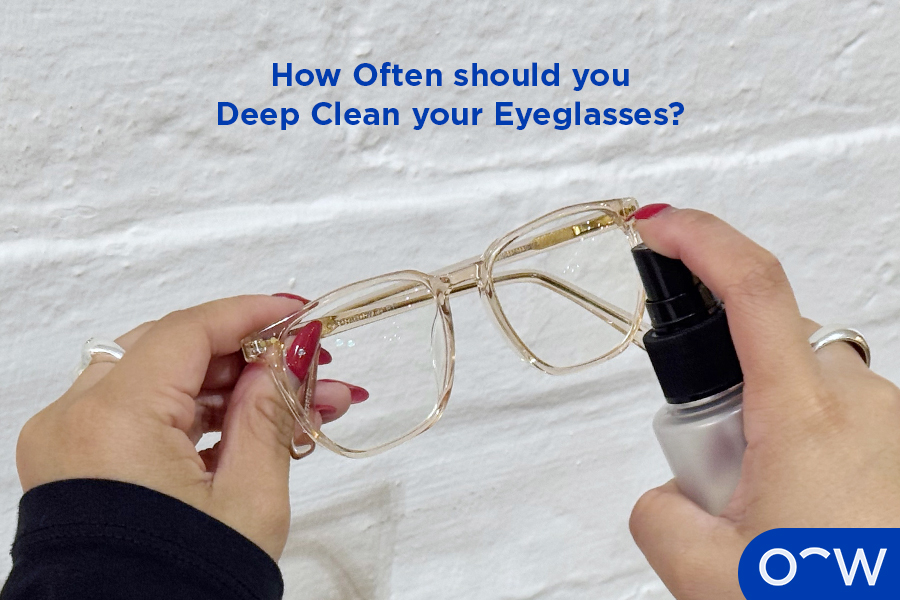

Can Improper Cleaning Make Eyeglasses Look Cloudy Permanently
Yes, in some cases improper cleaning can make eyeglasses look cloudy permanently. For example, if you use cleaner with harsh chemicals this can lead to a cloudy film forming over the lenses. However, it may not be permanent damage in all cases if improper cleaning occurs, and cloudiness may just be a temporary issue. Check out this article for more tips on how to clean glasses.
Can Super Glue Make the Eyeglasses Cloudy?
Yes, super glue can make eyeglasses lenses cloudy. Superglue may be used by people to repair glasses if there are damaged parts, despite this being an unreliable method. Some of this superglue can rub off on the lenses and as a result turn them cloudy. To remove super glue from eyeglasses, mild, soapy water might be the gentlest and safest option.


